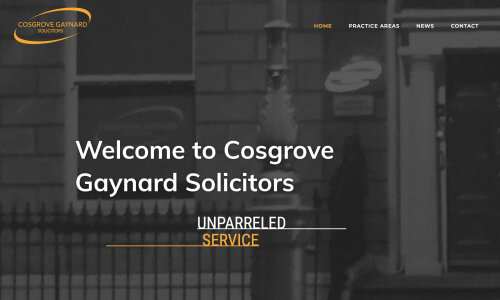Best Nonprofit & Charitable Organizations Lawyers in Dublin
Share your needs with us, get contacted by law firms.
Free. Takes 2 min.
List of the best lawyers in Dublin, Ireland
About Nonprofit & Charitable Organizations Law in Dublin, Ireland
Nonprofit and charitable organizations in Dublin, Ireland, play a crucial role in addressing social issues and promoting community welfare. They are established for purposes such as education, relief of poverty, advancement of religion, or other activities benefitting the community. The legal framework governing these organizations ensures that they operate within the boundaries of the law while maintaining public trust. This area of law includes the establishment, operation, taxation, and governance of nonprofits and charities, which must comply with various statutory requirements to maintain their charitable status and tax-exempt benefits.
Why You May Need a Lawyer
Legal assistance may be necessary for several reasons when dealing with nonprofit and charitable organizations. Common situations include:
- Setting up a nonprofit or charity and navigating the application for charitable status.
- Ensuring compliance with reporting obligations and regulatory requirements as outlined by the Revenue Commissioners and the Charities Regulator.
- Interpreting and applying governance and fiduciary duties for board members.
- Advising on employment law issues within nonprofit organizations.
- Handling disputes or litigation involving nonprofit entities or their beneficiaries.
- Developing policies to mitigate risks related to fundraising, data protection, and volunteers.
Local Laws Overview
In Dublin, Ireland, nonprofit and charitable organizations are subject to several key pieces of legislation:
- The Charities Act 2009 - Provides a regulatory framework for charities and establishes the Charities Regulator.
- The Companies Act 2014 - Governs the incorporation and operation of companies, relevant for nonprofit companies limited by guarantee.
- The Taxes Consolidation Act 1997 - Contains provisions relevant to the tax treatment of charities.
- GDPR (General Data Protection Regulation) - Applicable to nonprofits handling personal data, ensuring privacy and data protection.
These laws ensure accountability, transparency, and legal compliance within the sector.
Frequently Asked Questions
What are the legal requirements to establish a nonprofit in Dublin, Ireland?
To establish a nonprofit in Dublin, you must choose an appropriate legal structure (commonly a company limited by guarantee), draft a constitution or governing document, register with the Companies Registration Office (CRO), and apply to the Revenue Commissioners for charitable tax exemption.
Do all nonprofits in Ireland need to register with the Charities Regulator?
Yes, all organizations that operate or claim charitable status must register with the Charities Regulator unless they are specifically exempted.
What is the significance of charitable status in Ireland?
Charitable status confers several benefits, including tax exemptions and eligibility for certain grants. It also enhances the organization’s credibility with donors and the public.
Can a nonprofit employ staff?
Yes, a nonprofit can employ staff. It must comply with employment laws, ensuring fair treatment and rights for all employees.
What are the duties of directors in a nonprofit organization?
Directors have fiduciary duties to act in the best interest of the nonprofit, manage resources responsibly, ensure compliance with laws, and avoid conflicts of interest.
How does a charity maintain its tax-exempt status?
A charity must comply with tax laws and regulations, file necessary returns, and adhere to the objectives outlined in its charitable purpose to maintain tax-exempt status.
What reporting obligations do nonprofits have in Ireland?
Nonprofits must file annual returns with the Companies Registration Office and financial reports with the Charities Regulator. They may also need to report to other agencies depending on their activities.
Are there restrictions on fundraising activities for charities?
Yes, fundraising activities must comply with legal standards, including transparency, honesty, and compliance with regulations to protect donors and beneficiaries.
How can a nonprofit dissolve legally in Ireland?
A nonprofit can be dissolved by a resolution of its members or by winding up due to insolvency. The process must comply with the relevant provisions under the Companies Act 2014.
Can foreigners establish or serve on the board of an Irish nonprofit?
Yes, foreigners can establish or be involved with Irish nonprofits, but they must comply with relevant legal and regulatory requirements.
Additional Resources
For further assistance and information, consider reaching out to the following resources:
- Charities Regulator - Provides guidelines, registration resources, and compliance information.
- Revenue Commissioners - Offers details on tax exemptions and filing requirements for charities.
- The Wheel - A support and representative body for community and voluntary organizations in Ireland.
- Irish Council for Civil Liberties - Offers guidance on governance and legal matters for nonprofits.
Next Steps
If you believe you need legal assistance with your nonprofit or charitable organization, consider the following steps:
- Consult with a solicitor who specializes in nonprofit and charitable organization law to assess your needs and guide you through the legal requirements.
- Gather relevant documents, such as your organization’s constitution, financial statements, and any correspondence with regulatory bodies in preparation for legal consultation.
- Utilize advisory services offered by nonprofit support organizations to gain preliminary insights and resources.
Taking these steps will help ensure your organization is compliant and effectively serves its community-based mission.
Lawzana helps you find the best lawyers and law firms in Dublin through a curated and pre-screened list of qualified legal professionals. Our platform offers rankings and detailed profiles of attorneys and law firms, allowing you to compare based on practice areas, including Nonprofit & Charitable Organizations, experience, and client feedback.
Each profile includes a description of the firm's areas of practice, client reviews, team members and partners, year of establishment, spoken languages, office locations, contact information, social media presence, and any published articles or resources. Most firms on our platform speak English and are experienced in both local and international legal matters.
Get a quote from top-rated law firms in Dublin, Ireland — quickly, securely, and without unnecessary hassle.
Disclaimer:
The information provided on this page is for general informational purposes only and does not constitute legal advice. While we strive to ensure the accuracy and relevance of the content, legal information may change over time, and interpretations of the law can vary. You should always consult with a qualified legal professional for advice specific to your situation.
We disclaim all liability for actions taken or not taken based on the content of this page. If you believe any information is incorrect or outdated, please contact us, and we will review and update it where appropriate.














